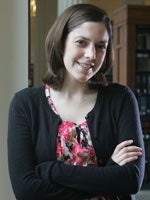Elizabeth “Libby” Benton ’11 is the winner of the 2011 Andrew L. Kaufman Pro Bono Service Award, after performing over 2,300 hours of free legal services while at HLS. The Class of 2011 surpassed the HLS record for pro bono hours, performing a total of 366,204 hours, an average of 628 hours per student.
“The Class of 2011 has gone way above and beyond what was required of them, with each student doing, on average, over 600 hours of pro bono work while at HLS!,” said Lisa Dealy, assistant dean for the HLS Office of Clinical and Pro Bono Programs. “This is the highest number of pro bono hours from one class since the inception of the program – we couldn’t be prouder of their accomplishments!”
Benton’s activities include: Harvard Legal Aid Bureau, Shelter Legal Services, No One Leaves Board Member, Harvard Delta Project, and summers at American Civil Liberties Union of Michigan and Greater Boston Legal Services. She received a Skadden Fellowship to continue her work at HLS’s WilmerHale Legal Services Center in Jamaica Plain, Mass., representing low-income tenants and former homeowners facing post-foreclosure evictions. She will work with community organizations and financial institutions to create long-term affordable housing for families and communities.
Many students accrued pro bono hours by participating in the HLS Clinical Program, through which they handle real cases in a variety of areas while under the mentorship of clinical faculty and instructors. Others worked on pro bono projects during spring break or the school year.
The Andrew L. Kaufman Pro Bono Service Award is granted each year in honor of Professor Andrew Kaufman, who has been instrumental in creating and supporting the Pro Bono Service Program at HLS. The J.D. student in the graduating class who performs the highest number of pro bono service hours receives the award and a $500 honorarium. The Office of Clinical and Pro Bono Programs annually determines the winner based on records of total completed pro bono hours submitted by students.
Highlights of the class of 2011:
- Graduates performed 366,204 hours of pro bono service, an average of 628 hours per student. Every year since students have graduated with the pro bono requirement, the total number of class hours and the average number of hours per student have increased.
- 118 students performed more than 1,000 hours of pro bono service.
- 12 students performed over 2,000 hours and the competition for the Kaufman award was very close. They are:
- Elizabeth Benton
- David Carpman
- Jennifer Collins
- Morgan Craven
- Aaron Dulles
- Kelsey Engelbrecht
- Ashleigh Georgia
- Alana Greer
- Stacey Kennard
- Rachel Lauter
- Marielle Macher
- Jennifer Tarr
- 72% of students did at least one clinical.
- 73% of students spent a summer doing public interest work.
Some noteworthy clinical and pro bono projects:
- More than 100 students in the past three years have worked on the innovative Mississippi Delta Project, seeking to transform one of the poorest regions in the country through law and policy projects in the areas of education, public health, and economic development. Students drafted a bill to exempt farmers’ markets from the Mississippi sales tax, in order to make fresh foods cheaper. The bill was passed unanimously by the legislature and signed into law by the governor last spring. Students also landed an important regulatory change in Mississippi to allow farmers’ markets to accept food stamps, which will help get healthy foods to low-income people. This spring break, students worked collaboratively with the HLS Transactional Law Clinic and the Ole Miss Law School Transactional Law Clinic to provide legal training and a guide for blues musicians, and they helped the city of Memphis revise its food code.
- In the Health Law and Policy Clinic, students have traveled to North Carolina, South Carolina, Arkansas, Alabama and other states to document access to health care for low-income people and help local organizations improve access through strategic advocacy. Students and clinical instructors are also on call as first responders to analyze all major congressional proposals for healthcare legislation. Within 72 hours, they provide a summary of each proposal – some of which are thousands of pages long — to a coalition of 100 national and state-based organizations around the country, determining whether the proposed reforms will improve health care access for low-income people.
- Through the work of Project No One Leaves and the Harvard Law School Foreclosure Task Force, students have kept hundreds of Boston residents in their homes despite foreclosure proceedings. They’ve won large verdicts for tenants whose homes were not kept in good repair, and they’ve helped nearly 100 people buy back their homes at affordable prices after foreclosure. The Harvard model is so successful that it is spreading to other cities and law schools—after a fall conference and training at HLS, there is now a No One Leaves Miami project at the University of Miami Law School, and a home buy-back program is starting up in New York.
- In the Cyberlaw Clinic at the Berkman Center for Internet & Society, students are working on an exciting project in partnership with the Massachusetts court system to help low-income people, people with disabilities, and others use the Internet to get easier access to the court system. Students in the clinic have also worked with the U.S. Attorney’s Office and local district attorneys’ offices to help prosecute child exploitation and other cybercrimes.
- In the International Human Rights Clinic, students have worked on projects in Thailand, India, Colombia, South Africa, and many more places throughout the world. HLS’s International Human Rights Clinic is one of the only law school clinics in the world working in the field of humanitarian restrictions on weapons, and our students this year traveled to Geneva to a UN disarmament conference, where they urged diplomats to impose stronger international laws regarding the use of incendiary weapons.
